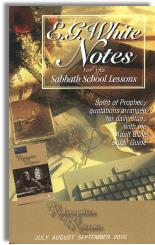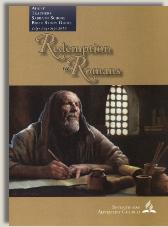|
||||||||||||||
Commentary on "All the Rest Is Commentary"
Day 2: Sunday, September 19, 2010 - The Weak Brother
Overview
Today’s Lesson tells us that the discussion in Romans 14 only addresses the question of meats sacrificed to idols, and not about foods that had been declared unclean in the Old Testament. Although the Jerusalem Counsel had ruled in Acts 15 that believers should not eat such meat, the question remained as to whether meat sold in the market had been sacrificed to idols. Some Christians avoided all meat because of this question, while others didn’t worry about it at all. Paul encourages the members to welcome each other with full acceptance, regardless of where they stood on the issue.
The Lesson also suggests that the “weak” Christian was “judged overscrupulous, apparently, not by God, but by his or her fellow Christians.” This would mean that the differences here between strong and weak seemed to exist only in the minds of those believers.
None of this had anything to do with vegetarianism or healthful living, the Lesson states, and Paul was not implying that the distinctions between clean and unclean meats had been abolished. To assume this would be to misapply scripture. Those Levitical rules of healthful living still apply to Christians today, and are supported by other passages in the New Testament.
Observations
The Lesson does not answer the question as to what Paul meant by “strong,” or “weak” in faith. This is unfortunate, because the meaning of this chapter comes alive when we examine what Paul meant by these categories of faith. What are the characteristics of the strong and the weak? First, they have things in common:
- Both types of Christian have faith, and God has welcomed them both (vs.1).
- They both are living by what their consciences will allow (vss. 2,5)
- They both honor the Lord in how they eat, drink and live. Some honor Him by abstaining, and some by partaking (vs.6). They both are giving thanks to God.
Paul does not criticize anyone here for having weak faith or no faith. Nor does he express the outrage that he unleashed on the Galatians. That church had come under the spell of Judaizers who taught that Christians could maintain right standing with God through observing the law. That was legalism, a fatal heresy that Paul met with fury. In Rome, there were two groups of believers, those with strong faith, and those with weak faith. They were not legalistic, but they were acting in a judgmental manner over disputable matters.
The question remains, what did Paul mean by “weak” faith? We know that the weak believed that they honored God by abstaining from meat and drink and by keeping certain days. They were not legalists, trying to gain salvation by their abstaining, but they were concerned that God was more pleased with their avoidance of certain things. Their motivations are recognized here as being good: honoring and glorifying God. But their thinking was still weak. Paul doesn’t say here why their beliefs are weak, but we find strong clues as to what kind of knowledge they lacked to have strong faith. In I Corinthians, Paul discusses the eating of foods offered to idols, and explains why this defiles the consciences of some believers:
“Yet for us there is one God, the Father, from whom are all things and for whom we exist, and one Lord, Jesus Christ, through whom are all things and through whom we exist. However, not all possess this knowledge. But some, through former association with idols, eat food as really offered to an idol, and their conscience, being weak, is defiled.” I Corinthians 8:6,7
They lack the knowledge that that all things exist by and for Christ, and that there are no other powers in the universe that have ownership over any of His creation. That is the knowledge that the strong in faith have, allowing them to eat everything. This could even include meat and wine that was offered to idols, or foods considered unclean by Levitical law. However, not all posses this knowledge. Later in chapter 10, Paul tells them again what they need to know about food and idols, so they can have freedom and strong faith:
“Eat whatever is sold in the meat market without raising any question on the ground of conscience. For ‘the earth is the Lord’s, and the fullness thereof.’” I Corinthians 10:25
We can honor God by eating foods that others consider unclean or defiled by idolatry, because we can know that everything belongs to the Lord, and in fact, exists for His purposes alone. There are no creatures that were made by or for Satan, or some other malevolent power. All were made by Him, and for Him. God’s absolute ownership of the world should govern even our diets, and that confidence takes the fear out of eating and living. But not every believer knows this, and so they fear displeasing God or defiling themselves by what they eat or drink.
Summary
- Those with strong faith and those with weak faith are both honoring God with their faith, even though they make different choices.
- The Roman Christians were not legalists like the Galatians, who made law-keeping a condition of maintaining salvation.
- The motivations of those with weak faith were good, but this was based on a faulty knowledge of God and His Lordship of Creation.
- Weak faith lacks the knowledge that everything has been created by God and for God, and is good of food.
- No creatures were created by or for Satan, for the earth is the Lord’s and everything in it. That knowledge takes the fear out of eating.
Copyright 2010 BibleStudiesForAdventists.com. All rights reserved. Revised September 20, 2010. This website is published by Life Assurance Ministries, Glendale, Arizona, USA, the publisher of Proclamation! Magazine. Contact email: BibleStudiesForAdventists@gmail.com.
The Sabbath School Bible Study Guide and the corresponding E.G. White Notes are published by Pacific Press Publishing Association, which is owned and operated by the Seventh-day Adventist church. The current quarter's editions are pictured above.
Official Adventist Resources
Standard Edition Study Guide Week 13
Teacher's Edition Study Guide Week 13
Easy Reading Edition Study Guide Wk 13
Search the Complete Published Ellen G. White Writings


